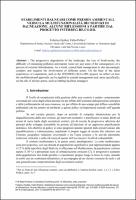Chapter Stabilimenti balneari come presidi ambientali. Verso la multifunzionalità dei servizi di balneazione. Alcune riflessioni a partire dal progetto Interreg RE.CO.RD.
| dc.contributor.author | Pollice, Fabio | |
| dc.contributor.author | EPIFANI, Federica | |
| dc.date.accessioned | 2022-06-01T12:14:03Z | |
| dc.date.available | 2022-06-01T12:14:03Z | |
| dc.date.issued | 2020 | |
| dc.identifier | ONIX_20220601_9788855181471_300 | |
| dc.identifier.issn | 2704-5846 | |
| dc.identifier.uri | https://library.oapen.org/handle/20.500.12657/56117 | |
| dc.description.abstract | The progressive degradation of the landscape, the loss of biodiversity, the difficulty of containing pollution and marine waste are just some of the consequences of a process of extreme littoralisation. As a result, coastal land management is also increasingly complex and requires the involvement of different actors. On the base of the latest experiences of cooperation, such as the INTERREG Re.Co.RD. project, we reflect on how the multifunctional approach can be applied to coastal management and, more specifically, on the role of private actors, such as bathing facilities managers. | |
| dc.language | Italian | |
| dc.relation.ispartofseries | Proceedings e report | |
| dc.subject.other | Multifunctionality | |
| dc.subject.other | Coastal management | |
| dc.subject.other | Marine litter | |
| dc.subject.other | littoralization | |
| dc.subject.other | Re.Co.RD project | |
| dc.title | Chapter Stabilimenti balneari come presidi ambientali. Verso la multifunzionalità dei servizi di balneazione. Alcune riflessioni a partire dal progetto Interreg RE.CO.RD. | |
| dc.type | chapter | |
| oapen.identifier.doi | 10.36253/978-88-5518-147-1.22 | |
| oapen.relation.isPublishedBy | bf65d21a-78e5-4ba2-983a-dbfa90962870 | |
| oapen.relation.isbn | 9788855181471 | |
| oapen.series.number | 126 | |
| oapen.pages | 10 | |
| oapen.place.publication | Florence |

